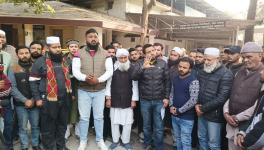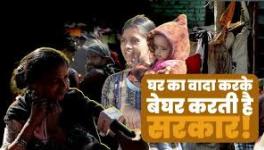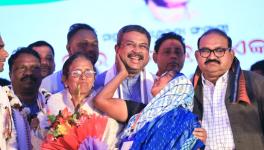Khela Hobe or How to Trivialise an Election TMC/BJP Style

(Representative image) Prime Minister Narendra Modi and West Bengal chief minister Mamata Banerjee during a function at Victoria Memorial, Kolkata, earlier this year (Pic: Twitter, Indian Express).
Game on it is in West Bengal, they say. They are all saying, rapping it out loud even. Khela hobe! But what exactly is this game and where exactly is this game taking the state, and in a larger sense, the country? It is time for us to pause, rewind, recheck and think of the larger implications of trivialising elections — the most important process in Democracy — as a game that needs to be won at any cost. The repercussions this thought would have on the present and future of this country. Khela hobe is going to alter the rules of the ‘game’ for a long time to come, and it is not going to be pretty in the history books.
But first, let us get sports out of this game. No, khela hobe is not related to Khelo India. Couldn’t help falling into the sarcasm trap on this one! khela hobe has nothing to do with the sport loving Bengali society, nor with the Kolkata derby on the football field either. Though both sports and football in the state are on iffy grounds. In stark contrast to the notion of Bengal being a hotbed of sports promoters and lovers. That in itself illustrates the reality we face in India at the moment. Reality glazed and gloried in history, heritage, culture and religion, but far from truth.
That khela hobe is rooted in sports is a narrative which got traction along with the slogan billed as the voice of Bengal election and an indicator on which side the wind is blowing.
The slogan could have its source on one of the desks in Prashant Kishore's campaign team office though its roots lie outside of the country.
Also Read | Genius-level Defection ‘Strategy’ Sinking BJP in West Bengal
It seems khela hobe is not Indian. The slogan or the usage, or the phrase was, reportedly, coined across the border in Bangladesh a few years back by Awami League MP Shamim Osman. It did catch attention this side of the border too and was apparently popularised in West Bengal by Anubrata Mondal, president of Trinamool Congress in Birbhum district. He had, as per reports, said at a political event: “Khela hobe. Bhoyonkor khela hobe. Ei mati te khela hobe (Game is on. A dangerous game is on. A game will happen on this ground)."
Then the songs happened, posters came out, the Prime Minister of India, Narendra Modi, countered with “Khela Shesh (Game Over)” along with his favourite word, Vikas. Jai Shri Ram is passe! “Vikas Hobe... Khela Shesh”, says the PM, and in the cacophony, the real issues that need to be discussed get lost. The narrative has been similar in each and every election in the past decade.
Bengal is an important state for the Bharatiya Janata Party (BJP). It is the season opener too, to use a sporting term. The election could leave the powers at the centre jolted. And the BJP has been playing their usual cards in the state. The tried and tested formula revolving around the very real religious and regional identity divides that play in Bengal too, even while citing corruption, along with the ‘vikas’ rhetoric.
Beyond that, the largest party in the country has nothing much to say in Bengal, other than orchestrate disruptive moves such as tearing up posters in Kolkata’s iconic Indian Coffee House. “Don’t vote for BJP”, on those posters, are not just words, but an emotion that cuts across the divides in the country. The divides set up by the BJP itself. Not sure if tearing up posters will help the party’s cause much like one is not sure whether Khela Hobe songs and posters would help Trinamool Congress (TMC).
Also Read | Four Poll-Bound States: Which One Cares for the People?
The incumbent government of West Bengal would have to answer questions on many raging issues if they get raised in the build-up to the mandate that is.
The primary one trumping khela hobe should be the point that unemployment is at an all time high in the state. Well, this question should rattle BJP as well. There are virtually no employment opportunities available in the state. No major industries have come up while existing ones are in bad shape. Recruitments through Staff Selection Commission (SSC) and Teachers' selection (TET) are in a mess following large scale corruption charges and intervention from the High Court. Corruption and allegation of favouritism while disbursing government projects is another question. The prominent and most unethical among them being allegations of huge corruption in distribution of relief funds and materials after Cyclone Amphan.
The BJP, meanwhile, has no easy way out either if the people start asking real questions. Minorities in the state are living in constant fear after the passing of the Citizenship Amendment Act (CAA) in the Parliament. And, the party’s aggressive campaigns along communal lines have resulted in growing and visible tension in the state. The 34 years of Left rule in West Bengal witnessed no communal riots, even during the Babri Masjid demolition. The BJP’s latest headache in the state is dissent among its ranks on the allotment of seats to newly defected TMC leaders.
Questions are aplenty and it seems both parties — the BJP and the TMC — have found a simple answer to all their problems: The Game, which happens to be trivialising not just the electoral process, but also the interplay of religion and politics, the biggest tactic in this playing field.
“To attribute an electoral competition as a kind of a game is definitely trivialising this competition, '' says Sarthak Bagchi, Assistant Professor, School of Arts and Sciences, Ahmedabad University.
“It is certainly trivialising the stakes which are engaged in this kind of an electoral contest,” the political scientist adds. “It is done under the premise that there is competitiveness which is similar to that in the field of sports. Therefore, maybe, the phrase reflects that kinda competitiveness in the electoral domain. However, my suspicion is that this is largely to trivialise the interplay of religion and politics. So, the communalisation of the political and social phase and public sphere which has happened in Bengal.”
Also Read | Myth of Internationalisation of Democracy
And when campaigns get taken over by frivolous slogans and riled up emotions, what gets lost is the larger meaning of the electoral process, which is that idea that is not the parties or the politicians which win elections but the people. With the newly spun Khela Hobe and its counter Khela Shesh narrative, a subconscious conditioning of the minds of the voters is taking place as well. That the victory is anyways not theirs but of the parties and the politicians. Bagchi explains the theory behind elections and how it happens to be renegotiation of a contract between the people and the government. And how periodic renegotiation and setting of new terms is important for Democracy. That renegotiation will never happen if the right issues are not the deciding factors in elections. And if this trend is tried, tested and cleared in Bengal, it will stay on in Indian democracy, haunting it for a long time to come.
"In a democratic framework, the society and state interact with each other through certain terms of negotiation,” explains Bagchi. “These terms are set around the idea of the social contract between the ruled and the rulers. Elections allow the ruled to interact, reprimand if necessary and hold their rulers accountable to their actions (or lack of actions). This process is very important for churning the health of a democratic soil, so to speak."
The election is a renewal of that contract.
“In that framework, the election provides an opportunity or a platform periodically when the population can negotiate and rework the terms of that contract,” adds Bagchi. “It can decide whether it wants to stick to the existing party in the contract or change given there valid reasons acceptable to the majority. Political parties are but aggregators of interest in this framework. In their catchment area, they aggregate, represent and promote these interests, be it based on caste, religion, regional identity or objective factors such as development.”
The same factors play out in Bengal as well — from employment, inflation and development to those stemming from the social and religions set up, says Bagchi. “In the state, social identities exist. Caste differences exist — the Namasudras, the Mathuas, the Rajbanshis, different communities exist and have their own interests . The idea of backwardness of certain communities and preferential allocation of resources to certain communities over others also exist. Now the question is how the articulation of these interests on the basis of identity takes place. How effectively it has been done.”
Also Read | The Name Game: Concrete Advertising or Advertising Via Concrete?
The attempt, however, has been to keep the factors under wrap to build a larger more emotion-driven articulation for the masses to latch on to. One we are so used to seeing on the playing field when the Indian cricket team plays. So, Khela Hobe may not have its roots in sport, but the idea with which it is applied is a very effective formula employed in the playing field.
We are talking about the cricket match which comes around in every ICC tournament — the India vs Pakistan blockbuster, generally and casually billed as war.
There is something seriously wrong when a match — be it any sport — is billed as war. Sport is not war, and war is definitely not a sport or a game of recreation ending with a trophy to be celebrated. However, we all know it is convenient to sell war. And when it is sold alongside a cricket match in India, it is a sureshot winner.
India vs Pakistan on a cricket field, arguably, beats all of the fabled sport rivalries in the world. However, when it is billed as war, then no team, or their fans, win the match. It is won by the larger players that benefit from the condition of one set of people looking at another set of people as enemies, and even a cricket match as war.
Both are sinister in their own way — casually billing sport as war, and trivialising election as a game. They steal away something very precious — the sanctity in sport, and the sanity in democracy.
Get the latest reports & analysis with people's perspective on Protests, movements & deep analytical videos, discussions of the current affairs in your Telegram app. Subscribe to NewsClick's Telegram channel & get Real-Time updates on stories, as they get published on our website.
























